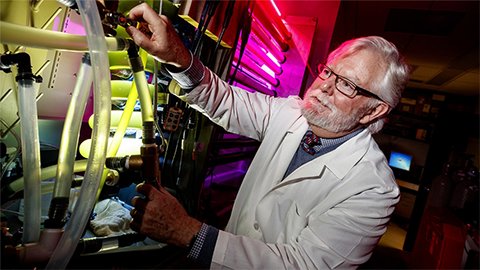Black’s career balances teaching and research
When Paul Black was a postdoc at the University of California, Irvine, two undergrads helped him with projects on long-chain fatty acid transport that succeeded due to their combined efforts. The research was published in the Journal of Biological Chemistry (papers are here and here), and that one-on-one interaction with students became the foundation of Black’s teaching philosophy.
In honor of a career shaped by that philosophy, Black will receive the American Society for Biochemistry and Molecular Biology’s 2020/2021 ASBMB Award for Exemplary Contributions to Education.

Black was teaching biochemistry at the University of Tennessee in 1992 when the dean of medical education assigned him to develop a molecular cell biology program for medical students.
“This was in a time when there were more discipline-based classes being taught in the medical curriculum,” Black said. His course used a multidisciplinary approach, something new in those days, and the medical students and the biochemistry department honored him with the Golden Apple Award for excellence in teaching.
At the University of Nebraska–Lincoln, Black developed a new approach to biochemistry education using experiential learning and critical thinking skills. “His mission at UNL has been to develop a biochemistry program of inclusive excellence,” Donald Becker wrote in his letter nominating Black for the award.
Black bucks tradition with a specialized approach to designing biochemistry courses informed by basic research. He introduced a second-year course on scientific writing and analysis of scientific discourse and continues to receive positive feedback from students.
Black is passionate about inclusion in academia. “It is essential that we have inclusive excellence,” he said, “and it is extremely important that in the STEM disciplines there is a balance between men, women, minorities and individuals from communities marginalized by the scientific community.”
As chair of the UNL biochemistry department, he is close to his goal of a department with comparable numbers of male and female faculty. He is proud that his lab is enriched by students from many demographic and racial backgrounds.
Lipid metabolism and its practical applications
Paul BlackPaul Black’s lab has done seminal studies addressing fatty acid uptake into the cell. His team purified and characterized the bacterial fatty acid transport protein FadL and, working with a Harvard group, crystallized the protein and verified it was a fatty acid-responsive channel. They discovered fatty acid transport protein 1, FAT1p, which plays a role in getting fatty acids into yeast. Recent work with the Wistar Institute shows increased expression of FATP2 (an ortholog of FAT1p) in certain cancers, where it appears to regulate arachidonic acid uptake.
Beginning with a $2.4 million Department of Energy grant, Black’s team has addressed triglyceride synthesis in green algae for bioproducts and biofuels. By understanding the carbon–nitrogen balance during growth, they showed this system was also effective in removing nitrate from groundwater.
The aim is to mitigate a broad spectrum of health issues caused by high nitrate levels in groundwater prior to use for municipal drinking water.
Enjoy reading ASBMB Today?
Become a member to receive the print edition four times a year and the digital edition monthly.
Learn moreGet the latest from ASBMB Today
Enter your email address, and we’ll send you a weekly email with recent articles, interviews and more.
Latest in People
People highlights or most popular articles

Building a career in nutrition across continents
Driven by past women in science, Kazi Sarjana Safain left Bangladesh and pursued a scientific career in the U.S.

Kiessling wins glycobiology award
She was honored by the Society for Glycobiology for her work on protein–glycan interactions.

2026 ASBMB election results
Meet the new Council members and Nominating Committee member.

Simcox wins SACNAS mentorship award
She was recognized for her sustained excellence in mentorship and was honored at SACNAS’ 2025 National Conference.

From humble beginnings to unlocking lysosomal secrets
Monther Abu–Remaileh will receive the ASBMB’s 2026 Walter A. Shaw Young Investigator Award in Lipid Research at the ASBMB Annual Meeting, March 7-10 in Washington, D.C.

Chemistry meets biology to thwart parasites
Margaret Phillips will receive the Alice and C. C. Wang Award in Molecular Parasitology at the ASBMB Annual Meeting, March 7-10 in Washington, D.C.

